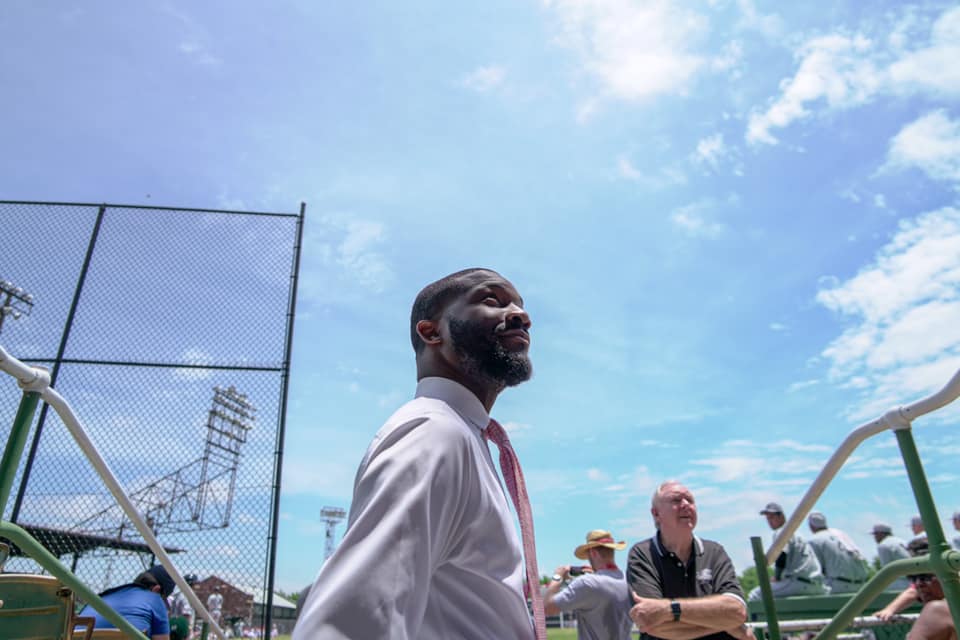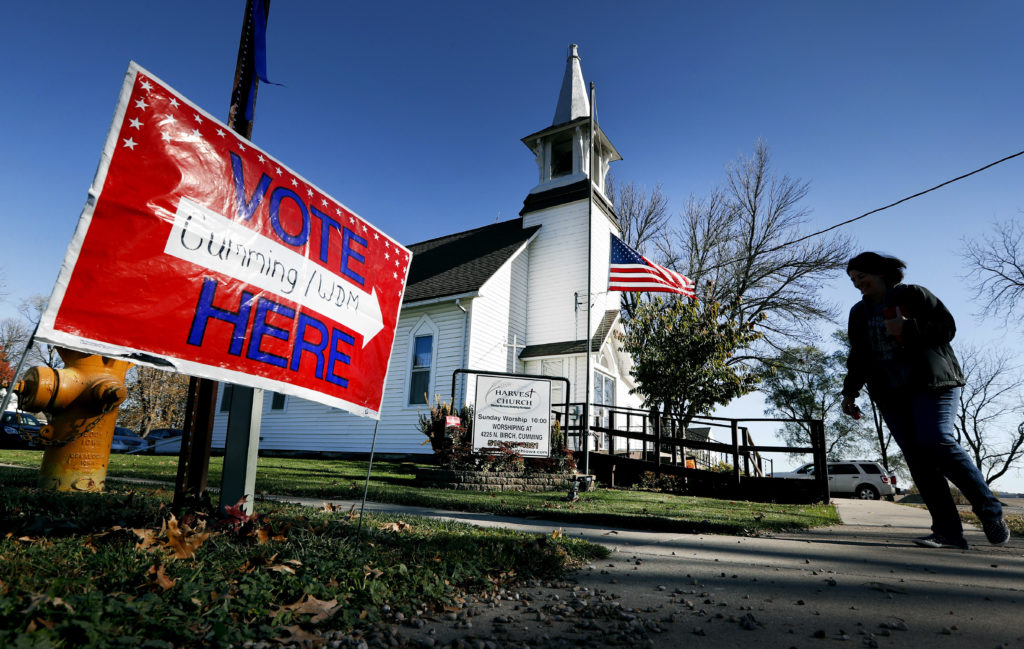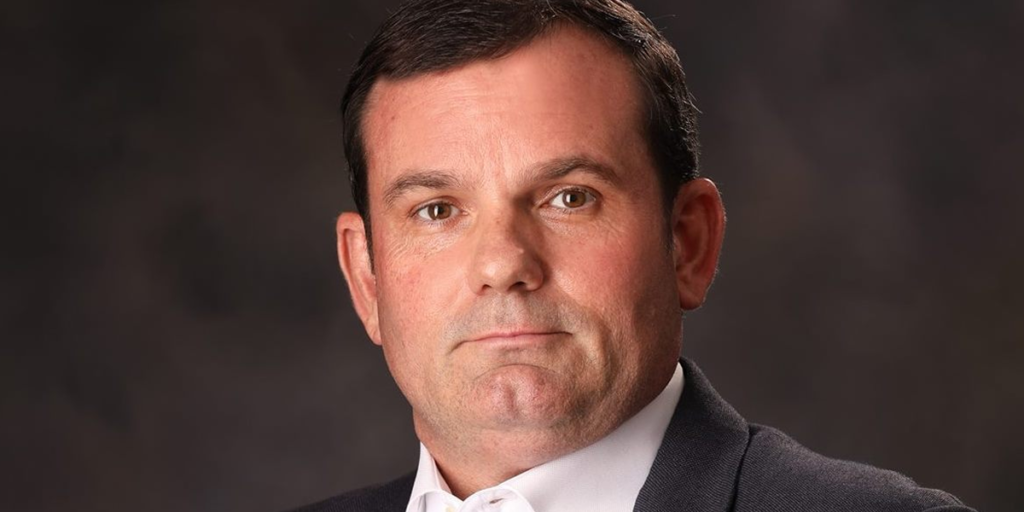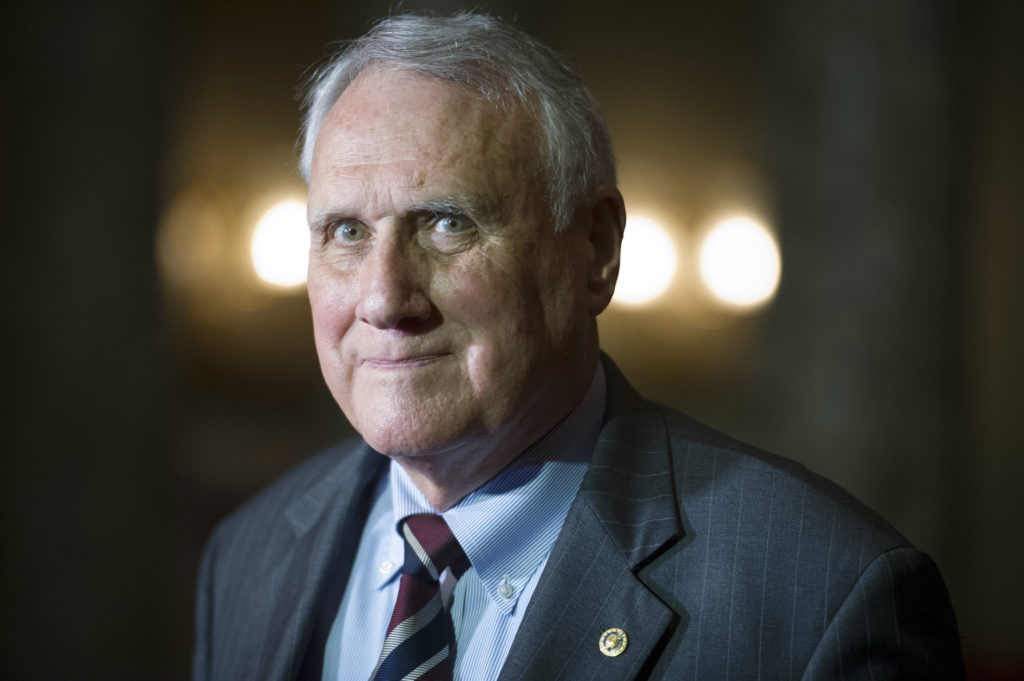Dear Mayor Randall Woodfin, Birmingham needs you to focus

“A deadly week, September homicides could foreshadow record year in Birmingham.” That is the headline that blared from Birmingham Watch I came across this morning. The article speaks to the fact in September alone, there have been six homicides in the Magic City. This puts us on-track to have our most violent year in 20 years. Think about that? Think about how far we’ve come in other areas of growth and development only to face the staggering reality of lives lost to violent crime. With the installation of Patrick Smith, Birmingham’s new police chief in early July, there was much hope that putting additional officers on the road and refocusing their efforts would mitigate some of this violence, but whatever changes have been made, they’ve not been enough. It leaves me questioning the focus of our leaders. Just yesterday, Alabama Today reported that Mayor Randall Woodfin is creating his own PAC. He, or one of his staff penned a passionate op-ed for AL.Com talking about the need for more progressive leaders. I would argue that rather than tell us about the greatness of additional leaders, Woodfin should focus on showing us what he can do because the facts don’t lie: whatever it is he’s doing isn’t working right now. Several months ago, Woodfin went to Netroots Nation a liberal political conference where he delivered a passionate keynote speech talking about the upcoming elections, he quoted Dr. Martin Luther King Jr. and he talked about making history. He spoke of being proud to be from Birmingham, Ala. But how much longer can he be proud of leading a city that’s seeing violence take hold and end valuable and vulnerable lives? He spoke of putting people first. Rather than giving speeches about it maybe he should do more to do it. “We deserve better,” he said, why yes, yes we do. As I highlighted in a earlier blog post, the number of magazine covers and photo-ops the Mayor seems to be doing is impressive by any standard for an up and coming socialite only the problem is the mayor wasn’t elected to build his brand. He was elected to strengthen our city. It’s worth noting that since that piece, he’s of course had at least one more cover story and photo shoot appearing in Birmingham Magazine. Thanks to Birmingham Magazine for this fun interview. I’m honored to serve as my hometown’s first millennial mayor and I’m happy to share my story. And yes, I like my rap LOUD. Turn it up. #TuesdayThoughtshttps://t.co/aW490wKLS2 — Randall Woodfin (@randallwoodfin) July 10, 2018 He even stopped to weigh-in on the Florida gubernatorial race. Ironically, the candidate he endorsed was the former mayor of Tallahassee which led the state in crime during his years in office. We need our mayor to understand that right now his attention need to be singularly focused the city on Birmingham. Not on political campaigns around the state or nation. Not on raising his own public profile, but on fixing this crisis of crime. Birmingham is on-track for another deadly year and while it may seem to some that since it’s not in their neighborhood or their area of metro-Birmingham it isn’t an issue. The fact is every life loss and every act of violence affects each of us. How much longer can Birmingham remain attractive to out of state or even international businesses if we don’t see true change and meaningful commitments to do better? How can we attract and keep young professionals to our workforce, or corporations — if people are deterred and chased away by the reality of crime and threats to their personal safety? Press conferences with moving speeches and photo-ops aren’t going to stop the criminals. In what I hope is a message that can get through to the mayor: you are young, and there are many years ahead of you in your political career. The time for grand-standing will not pass you by if you focus today. The time for setting yourself up for future, higher office will be around for years to come. Today, the people of Birmingham need you to do better, to do more, to focus on making our city safer in actions not in words.
How we can honor the memory of those who lost their lives on 9/11 with our actions

Today, as our nation pauses to look back and mourn the lives lost during the tragic terrorist attacks on our country on September 11, 2001, it’s important to also look at the strength and resolve of our nation and to remember that each day is an opportunity to do better for ourselves and in memory of those not with us anymore. Every year since 2001, nearly every person I know has stopped to share their story of where they were during the horrific attack. They speak of how it changed them and their relationships. I was in college at Florida State University, my mother worked at Orlando International Airport I remember being scared for her not knowing what was happening as it happened. I remember the shock and the grief but mostly I remember how we came together that day and in the days that followed. Everyone had a story to tell of where they were and what happened around them. As a nation, we collectively went through the stages of grief and then we healed together as members of a community that stretched across the country or maybe even across the world. After every disaster, whether it be the 9/11 attacks, hurricanes, wildfires, or terrible evil and criminal incidents like the Las Vegas or the Parkland shootings, we as a nation, instinctively turn towards, not away from one another. We strengthen our resolve to help those around us. We comfort and support one another. We look for solutions to the problems facing victims, survivors and first responders. In crisis we become the people I wish we were every day, thoughtful, caring and giving. It is hard for me to reconcile the nation that I love and the patriotic people who always show up and provide for those in need during times of crisis with the fact that some of those same people during regular days or heaven forbid during political season show incredible disrespect and disdain for those around them. In times of peace and normalcy it seems we forget our shared humanity and turn against one another seeing only our differences not our common goals or shared values. Today, on 9-11, I’m challenging myself and I challenge you, to pause and rethink this animosity — the way we react to it and the way we promote it. We should actively seek to stifle and not give power to those who seek to divide us as a country. We should stand united beside one another more often than we stand toe-to-toe. Today, as we celebrate the heroes who emerged that day, who put their lives on the line to save the lives of other we celebrate the spirit of a country that a did not allow the terrorists to win that day or any day since. It’s a day to not just remember the sense of community we felt that day but to feel it again, and then to turn around and do something to honor the memory of those not with us anymore. It’s an opportunity for us as parents to talk to our children about the spirit of true heroism and what it really means to be a hero. We use that term so lightly and loosely these days, but 9/11 showed us what true heroes were. They were the individuals rushing to the buildings as they were falling down. They were the individuals on the plane in Pennsylvania. We were reminded that day that heroes come in every shape a size. We can remember that in each of us there’s a way to honor the heroes in the days following the attacks there were so many who gave blood, who gave money and who gave of their time and skills. There were those who enlisted in the military. Then there were the ordinary miracles that took place in coffee shops, churches and homes where people sat with a grieving neighbor or stranger to comfort them. We need to tap into that spirit of love and kindness more often and that’s how we truly honor those we remember today. Today, let us remember the American spirit with more than words or memes, but our in actions tomorrow and the next day and every day after.
AP Poll: Voters open to candidates who aren’t very religious

Religion’s role in politics and public policy is in the spotlight heading toward the midterm elections, yet relatively few Americans consider it crucial that a candidate be devoutly religious or share their religious beliefs, according to a poll released Tuesday by The Associated Press-NORC Center for Public Affairs Research. Just 25 percent of Americans say it’s very or extremely important that a candidate has strong religious beliefs, according to the poll. Only 19 percent consider it very or extremely important that a candidate shares their own beliefs, and nearly half say that’s not very important or not important at all. Still, most Americans see a role for religion in shaping public policy. A solid majority of Americans, 57 percent, want the influence of religion on government policy to extend beyond traditional culture war issues and into policies addressing poverty. Americans are more likely to say religion should have at least some influence on poverty than on abortion (45 percent) or LGBT issues (34 percent). There is little public support for the campaign by some conservative religious leaders, backed by President Donald Trump, to allow clergy and religious organizations to endorse political candidates while retaining their tax exempt status. Such a change is opposed by 53 percent of Americans and supported by 13 percent. The rest expressed no opinion. Trump’s stance on political endorsements by clergy is one of many reasons he has retained strong support among white evangelical Christians, despite aspects of his behavior and personal life that don’t neatly align with Christian values. The AP-NORC poll found that 7 in 10 white evangelical Protestants say they approve of Trump, a Republican. The importance of a candidate’s religious faith varied across religious and political groups. Among white evangelical Protestants, 51 percent consider it very or extremely important that a candidate has strong religious beliefs. An additional 25 percent think it’s moderately important. Far fewer Catholics and white mainline Protestants considered this important. Roughly two-thirds of Republicans said it’s at least moderately important that a candidate has strong religious beliefs, compared with 37 percent of Democrats. Jack Kane, an accountant from Key West, Florida, was among the Republican-leaning poll participants who said it wasn’t important to him whether a candidate was deeply religious. “I’d much rather have a guy run the government and not spend all our money, instead of sounding off on what’s going on in the church or on things like abortion,” said Kane, 65, who describes himself as nonreligious. “Who is Catholic, Jewish, Southern Baptist — I could care less, as long as they’re going to carry the torch of freedom.” Kent Jaquette, a Republican-turned-independent and a former United Methodist pastor who lives near San Antonio, said he does not base his choice of candidates on their religious faith. “In politics, you need to look at a person where their morals are, where their values are,” he said. “It may or may not have anything to do with their religion.” Jaquette also questioned the motives of evangelicals who support Trump. “To me, it’s supporting someone who gives no indication he intends to live a Christian life,” said Jaquette, 63. “I believe that Christians should do things that Christ taught — feed the hungry, visit people in jail, help immigrants.” Veronica Irving, a 55-year-old Roman Catholic Republican who lives near Chicago, says it’s extremely important to her that a politician has strong religious beliefs. She’s disappointed that Trump doesn’t demonstrate this more clearly through his behaviors and actions. “It’s not about what faith you come from — it’s just important that you have faith,” she said. At the highest levels of political office, it’s still rare for a politician to profess that he or she is an atheist; surveys indicate that roughly 10 percent of Americans do not believe in a higher power. In recent years, only a small handful of members of Congress have identified themselves as nonbelievers. However, there is some evidence of increasing acceptance of religious diversity — for example, the recent victories by Muslim-American women in Democratic congressional primaries in Michigan and Minnesota. The AP-NORC poll found broad interest in religion having at least some influence on a range of policy issues. In addition to the concern about poverty, 49 percent of Americans want to see religion have some influence on education, 44 percent on health care policy, 43 percent on immigration, 38 percent on gun policy, 36 percent on income inequality, 34 percent on foreign policy and 32 percent on climate change. From each of the largest religious groups, there was strong support for greater religious influence on poverty policy — 71 percent of white evangelical Protestants, 54 percent of white mainline Protestants, 75 percent of nonwhite Protestants and 67 percent of Catholics. The Rev. Jim Wallis, founder of the Christian social justice organization Sojourners, said the poll findings signaled a potentially broader and more vibrant role for organized religion in U.S. politics. “Religious issues are much broader and deeper and different from the issues chosen by the religious right,” he said. “The issues like poverty, immigration, what happens to the homeless — those are becoming the moral and political and voting issues for more and more Christians.” The findings were welcomed by Maureen Malloy Ferguson, a senior policy adviser for The Catholic Association, which depicts its mission as “being a faithful Catholic voice in the public square.” “It’s encouraging to see that so many Americans recognize that religion can be a force for good in society,” she said. However, attorney Emilie Kao, a religious-freedom expert with the conservative Heritage Foundation, questioned whether faith-based organizations might face roadblocks in trying to expand their role in social services. Some jurisdictions, she noted, have sought to exclude religious organizations from various activities, such as adoption and foster care, because of opposition to same-sex marriage and other beliefs. ___ The AP-NORC poll of 1,055 adults was conducted Aug. 16-20 using a sample drawn from NORC’s probability-based AmeriSpeak panel, which is designed to be representative of the
What they’re saying: Alabama delegation remembers the 9/11 terrorist attacks

On Tuesday, the nation paused to remember the 17th anniversary of the 9/11 attacks, which killed nearly 3,000 people after hijacked planes crashed, with with tears and somber tributes. Here’s what the Alabama delegation is saying about that tragic day in American history: U.S. Sen. Richard Shelby: Today on September 11th, we recognize the tremendous strength of our nation. We will always remember the courage of those we lost, as well as those who bravely risked their lives to save others. #NeverForget U.S. Sen Doug Jones: Alabama 1st District U.S. Rep. Bradley Byrne: Almost 3,000 people died on September 11, 2001, including some great Alabamians. Today, let us remember their lives and say a prayer for their loved ones. As President George W. Bush has said, “I pray they will be comforted by a power greater than any of us, spoken through the ages in Psalm 23: ‘Even though I walk through the valley of the shadow of death, I fear no evil, for You are with me.’” Alabama 2nd District U.S. Rep. Martha Roby: May we #NeverForget the innocent lives lost and the brave lives sacrificed on this September day 17 years ago. Today especially, let us all remember the victims, honor the heroes, and prayerfully consider the families who still grieve the loss of their loved ones. Alabama 3rd District U.S. Rep. Mike Rogers: We Will #NeverForget. #911 Alabama 4th District U.S. Rep. Rober Aderholt: It’s been 17 years, but for so many, it seems like just yesterday. We will never forget! Alabama 5th District U.S. Rep. Mo Brooks: 17 years ago today, our nation experienced one of the greatest tragedies in our history. The evil act of unprovoked violence shook us as a people, but in the days following, Americans responded with heroism and acts of patriotism. We stood strong in the face of attacks on our God-given freedoms, and we will #NeverForget those who lost their lives that day and those who have since sacrificed in the fight against evil. Alabama 6th District U.S. Rep. Gary Palmer: Seventeen years ago, September 11th was a dark day for America when terrorist attacks on the World Trade Center, the Pentagon, and United Flight 93 resulted in the loss of almost 3,000 lives. The nation was stunned by the evil that struck us that day. But in the midst of that tragedy, we were also inspired. There are countless stories of great courage and sacrifice from that beautiful September day. We well remember the stories of courageous men and women putting their own lives in danger to try to save others, of courageous first responders who ran into the rubble and ruin in New York and Washington, DC and gave their lives in an attempt to rescue survivors. And of course, the brave passengers of Flight 93 will also always be remembered for how they thwarted the hijackers on their flight at the cost of their lives. Their sacrifice likely saved the U.S. Capitol from destruction. I pray that as a nation, we will never forget those whose lives were lost on September 11 or those who bravely sacrificed and died to save others that day. Whenever and wherever we can, we should offer comfort to the families and friends who still mourn. Though this is a sobering anniversary for us as a nation, one thing that we learned about ourselves is that, as in so many other tragedies, we can still take encouragement from the resilience of our people and our ability to unite in times of hardship. Alabama 7th District U.S. Rep. Terri Sewell: Today we honor the memory of those we lost and the courage of the brave men and women who sacrificed to save others on 9/11. We will never forget.
Kay Ivey encourages tech savvy students to participate in her App Challenge

Governor Kay Ivey is encouraging tech savvy students from every corner of the state to participate in her App Challenge — a statewide contest that encourages students K-12 to build their own app technology and put it into practice. The goal of the Challenge is to give more students the opportunity to gain recognition for their mastery and application of computer programming and design. “Since establishing my Advisory Council for Computer Science Education last year, we have been hard at work to make my vision of giving every Alabama student a 21st Century education into a reality. I’m encouraging students to become a part of this emerging technology economy and participate in the Governor’s App Challenge,” Ivey said. “This contest allows students from every corner of the state to get creative and build their own app while putting into practice computer science principles they are learning in the classroom.” New details about the Challenge On Monday Ivey announced new details of the challenge, which she launched in March at the inaugural Alabama Computer Science Summit. Students will create an application in a language of their choosing, respond in writing to specific prompts about the application and submit a video of their application running. Student submissions will be judged in one of three grade bands: Elementary: K-5 Middle School: 6-8 High School: 9-12 Apps will be judged at various levels, with only the winning entry in each grade band advancing to the next level. The first level of competition will be at the individual school. The winner(s) from each school will advance to the Local Education Agency (LEA) level. The winner(s) from the LEA level will advance to the State Board of Education district level and the winners from each of the State School Board districts will enter the state championship. The State School Board district winners will compete at the Alabama Computer Science Summit in April 2019, with winners announced at the conclusion of the summit. Participants must register by November 1, 2018. Watch Ivey’s announcement of the App Challenge below:
Incoming state lawmaker Shane Stringer involved in police shooting

The incoming state representative for House District 102, Satsuma Police Chief Shane Stringer, was one of two officers involved in a fatal shooting on Friday the Mobile County Sheriff’s Office (MCSO) has confirmed. Stringer — who bested his GOP opponent Willie Gray in the Republican run-off for House by only 28 votes, 2,580 to 2,552, does not have Democratic opposition in the Nov. 6 general election — was involved in a stand-off in Citronelle, Ala. with 63-year-old Ulman Jerald Roberts Friday morning. “Ulman broke into the home of his estranged wife and barricaded himself inside after she fled. Roberts fired at officers and was fatally injured in return fire,” reported AL.com’s Lawrence Specker. The MSCO confirms Roberts opened fire on Stringer, along with police officer Alfred Webb, before they returned fire. Roberts died from his injuries Friday.
Rauf Bolden: We need a trauma center in Orange Beach

It is hard to miss the distinct sound of disappointment. A stand-alone trauma center is not even in the planning stages, only bridges and roads, according to Orange Beach Mayor Tony Kennon’s 2017 Town-Hall Presentation, being available on the city’s web site. Prioritizing infrastructure over the urgency for healthcare is financially driven. Roads move people, pushing development forward, putting heads in vacation-rental beds, and generating huge revenues for the city. Whereas health-care facilities support families, tending the critically ill, generating an enormous sense of well being for the local community. This asymmetry in choices nurses the for-profit model, nested in an outdoor community where swimming, fishing and boating accidents happen, simultaneously developing contact-sports programs at the new Middle School/High School, located within a community of medically dependent retired residents is the mosaic we must plan for. Arguing for a 24/7 stand-alone trauma center with a helicopter pad on site over the need for another bridge makes sense to local families, because we should care for the people who live in Orange Beach first. Getting comfortable with the idea of driving 17 miles (29 minutes) to the nearest trauma center in Foley is misguided. We shouldn’t have to do that. Our public debate is marinated in despair, finding no answer for the critically injured, needing immediate state-of-the-art care in Orange Beach. “South Baldwin Regional Medical Center [in Foley] is your community healthcare provider,” according to a report on the hospital’s website. The Medical Center has an average review rating of 2.5 out of 5.0 from 128 reviewers, according to a report by Google. South Baldwin is the only facility in the area providing emergency-care-for-veterans, according to Larry Belmonte a Marine Corps veteran. We deserve better, understanding Orange Beach has Walk-In Clinics, being open during the day, supported by local Fire EMTs (Emergency-Medical Technicians) at night. The ambulance service is Med-Star, coming 17 miles from Foley, returning the patient 17 miles north to the trauma center. “I was about to lose consciousness when the helicopter landed so there are a few blanks. I had 2 stents immediately (last night) and had one more this morning. Thank goodness I didn’t have to have a bypass. I can tell you I am going to start doing some things on my bucket list when I’m cleared. Life is so short & there’s a lot less road ahead of us then there is behind us… life, love & happiness is what should matter for all of us… I’m so grateful to be here,” said Melba Morgan a resident of Green Cove Springs, Fla., having survived because her community provided state-of-the-art healthcare. Retired Hospital Administrator John D. Davis explained what is needed to start the conversation about a trauma center. “Certificate of Need (Alabama State Health Planning and Development Agency), resurrecting the Gulf Coast Health Care Authority, allowing the authority to issue bonds, studying the financial-feasibility, and determining realistic alternatives (Plan B),” estimating five beds are enough for a local trauma center in Orange Beach. Healthcare facilities are expensive, priced on a per-bed basis, “around $1.5 million per bed to build,” according to a report by Quora. “Whether as a patient or visitor, we’ve all been in a hospital and had ideas about what would have made our hospital experience exceptional. Thinking about what I would want to see as a patient coming in for surgery helps determine everything from signage to the design of the hospital rooms,” according to a report by Becker’s Hospital Review. To make this dream a reality we need local support. Orange Beach has a government of Mayor and City Council, being clear who is the junior partner. It is the Mayor who sets the agenda for the media and the government. Mayor Tony Kennon has dug his heels in, being clear about Council’s priority for an ALDOT (Alabama Department of Transportation) Bridge west of the Foley Beach Express, and the Wolf Bay Bridge by Doc’s over anything else. Still 1538+ members of the Facebook Group: “End The #Bridge2Nowhere,” are in opposition to the proposed span west of the Beach Express, thinking the State’s money could be better spent. The Mayor responded to this opposition. “i have been following with much interest the comments on this site [Facebook]. my suggestion is that everyone who is in disagreement with this bridge, in favor of the bridge, in favor of the road thru the park , those who r against the road thru the park and everyone who wishes to blow up the bridges so no one else can make it across the canal now that u have ur piece of the island, load up and come to a council meeting so that u can get the facts, the real truth and stop being educated into further ignorance by following this site. i welcome all of u. in the end we may agree to disagree but at least u have the true facts to base ur decision on. let me know of a date and i will make sure we accommodate the request,” said Mayor Tony Kennon in a Facebook post (End The #Bridge2Nowhere, June 18, 2018). His writing speaks volumes. Changing the Mayor’s mind, allocating funds for a local trauma center is not going to happen, perhaps he has simply lost touch with the needs of constituent families. Besides the political headwinds, other factors mount a convincing argument against a trauma center, including issues with Medicare and Medicaid patients, budgeting for “cuts to Medicare reimbursements, around $112 billion in the ensuing years,” according to a report from the Congressional Budget Office. Several exceptions to the make-it-pay model used to exist in Orange Beach, like the Sportsplex, Recreation Center, Aquatic Center, Tennis Center, Art Center, Golf Center and Senior Center, being maintained for the greater good of the community. Taking this now extinct precedent, and running with it is the only way to open a dialogue with City Hall. “The right to decide” is a simple and seductive slogan, applying it to a
Cam Ward steps up to address weak open records law in upcoming session

Over a decade ago, Alabaster-Republican State Sen. Cam Ward, sat on the “Open Records Study Task Force.” Tasked with revamping the Alabama’s Public Records Law that was first enacted in 1923, the group worked to create “a clear and uniform process through which citizens may obtain access to public information and documents.” Flash-forward 13 years later and Ward joins a chorus of people, including State Auditor Jim Zeigler who addressed the issue just yesterday, who think it’s time to revisit the law yet again in the upcoming 2019 legislative session. Ward told Alabama Today he’s been noticed “multiple problems” with the law pop over throughout the state. “Now that technology has evolved, the loopholes [in the law] have started presenting themselves. We need to take action and close those loopholes,” said Ward. Alabama’s Public Records Law is a relatively short, sweeping statement found in Section 36-12-40 of the Alabama Code that dictates the public’s right to inspect and copy official documents from the executive, legislative, and judicial branches of the state government. The law has also been applied by the courts to various city, county, municipal, and state personnel, departments, boards, and commissions. The problem Ward, and many others, are finding with the law is that it does not prescribe enforcement procedures. Should a government official fail to respond to the records request, citizens and the media must choose between letting their questions go unanswered, or filing a costly lawsuit in hopes of getting the information. “These smaller newspapers in the State, they don’t have a budget for these lawsuits, and the average citizen who is trying to provide oversight to their government really doesn’t have the budget for that. It just shouldn’t be so much of a problem for the government to be transparent,” Ward told Inside Alabama Politics who first reported on the bill today. Ward thinks they ought to be a penalty system to change. “We need a clear clarification for penalties when officials don’t provide information, or fail to provide it without unreasonable delay,” Ward explained. “That said, we need to figure what an appropriate turn-around time for these documents should be. After all, ‘reasonable’ is defined in the eye of the beholder.” Ward believes with technology advances, it should be easier than ever to provide electronic document to a requester as government officials no longer need to make copies of the documents, and are able to send them electronically now easing the process. Weaknesses in the law There is no language that states how long the state has to respond to a public records request. Fees are not stipulated by law. One department may charge one fee, while another may charge something entirely different. The Department of Corrections, for example, requires a flat $25 fee for them to begin to process a request. Meanwhile the Secretary of State’s office requires $1.00 per copied page, rather than a flat fee. Not all agencies have a clear employee in charge of requests, thus making tracking down the correct person difficult. There is no defined appeals process when a requestor does not get what they were asking for.
Republicans lack votes — and appetite — to end ‘Obamacare’

Arizona’s new senator says he’d vote to repeal the nation’s health care law. That’s one additional Republican ready to obliterate the statute because his predecessor, the late Sen. John McCain, helped derail the party’s drive with his fabled thumbs-down vote last year. It could well be too little, too late. After years of trying to demolish former President Barack Obama‘s prized law, GOP leaders still lack the votes to succeed. Along with the law’s growing popularity and easing premium increases, that’s left top Republicans showing no appetite to quickly refight the repeal battle. “I’m not going to be asking for another vote on that this year,” No. 2 Senate GOP leader John Cornyn of Texas said last week when asked if he favored reopening the issue in a postelection lame duck session. No. 3 House leader Steve Scalise, R-La., said, “We need to win this election and then get more seats next year.” Each is their party’s chief vote counter. That means any serious push to annul the statute would almost certainly hinge on Republicans retaining House control and adding Senate seats in November’s elections, neither of which is assured. If either goal eludes them on Election Day, President Donald Trump’s ability to deliver on one of his top campaign promises would have to wait for a second term, if he gets one. Republicans seemed to gain ground last week when Sen. Jon Kyl replaced McCain, who died in August from brain cancer. Kyl said in a brief interview that he would have backed the measure that McCain opposed, a pivotal vote that would have sustained the repeal drive. “It seems to me that would have been a useful thing to do,” Kyl said. That bill failed 51-49. A “yes” from McCain would have meant a 50-50 tie that Vice President Mike Pence could have broken by casting his own vote. Yet the two other GOP senators who also voted no, Maine’s Susan Collins and Lisa Murkowski of Alaska, haven’t relented. With Republicans controlling the Senate 51-49, the GOP remains short of the 50 votes they’d need. “I would still oppose outright repeal,” Collins said in a short interview last week. In a written statement, aides said Murkowski “is not interested in another rushed, partisan process in the absence of a quality, comprehensive replacement” for the law. Republicans have one fewer seat this year because Alabama Democrat Doug Jones defeated Republican Roy Moore in a December special election. Moore had defeated incumbent GOP Sen. Luther Strange in a party primary. Senate Majority Leader Mitch McConnell, R-Ky., has ruled out revisiting the health care fight before November’s midterm elections, citing the crush of spending and other bills facing Congress. He’s displayed little desire to revisit the issue, which many Democrats are using in their election campaigns because Obama’s law is widely accepted, especially provisions like requiring insurers to cover people with pre-existing medical conditions. Returning to the health care fight is a decision “I don’t have to reach anytime soon and don’t have time to facilitate, even if I was so inclined,” McConnell told reporters last week. He has said he doesn’t want to resume the fight unless he can win, and his House counterpart is also showing his focus is elsewhere. “I haven’t even thought about it,” said House Speaker Paul Ryan, R-Wis. A lame-duck session would last barely over a month and likely be absorbed with lingering budget disputes and picking the new Congress’ leaders. That would leave scant time for health care work, such as resolving intractable disputes about what a replacement bill would look like. Then they would need an official cost estimate of any bill from the nonpartisan Congressional Budget Office, which could take weeks. They’d also have to take procedural steps to protect their bill from a Senate Democratic filibuster, which would otherwise essentially kill the measure by requiring Republicans to garner 60 votes to succeed. “There’s still a process that we have to go through, and people have to be aware of it,” said Sen. Bill Cassidy, R-La., who opposes the health care program. “You don’t just drop it from heaven like manna.” Explaining the diminished urgency, Cornyn cited Congress’ repeal last December of the tax penalty on people who don’t buy individual insurance. That requirement, aimed at prodding healthier people to buy coverage and stabilize health markets, was one of the law’s least popular provisions. Cornyn also mentioned Trump administration rules making it easier for people to buy short-term health care policies or association plans offered by groups of small businesses or self-employed people. Such packages could offer lower premiums but cover fewer benefits, and Democrats criticize them as undermining the consumer protections Obama’s law was designed to enshrine. Also easing pressure on Republicans to act are indications that insurance premiums, a major vexation for voters, are growing more slowly. An analysis by the consulting firm Avalere Health and The Associated Press last week found a 3.3 percent average increase in proposed or approved premiums across 47 states and Washington, D.C., for 2019. The average increase nationally this year was about 30 percent. Meanwhile, the House plans to vote this week on a bill easing requirements the law imposed on employers. The measure would make it easier for companies to provide health insurance for fewer workers, refund tax penalties firms paid for not covering employees and postpone a levy on expensive policies companies provide workers. Further underscoring the effort’s lack of traction, that measure seems certain never to emerge from Congress. Republished with permission from the Associated Press.
Birmingham impounding rideshare scooters

The city of Birmingham is impounding electric scooters that a rideshare company left around the metro area. Police say more than 40 scooters had been confiscated by Monday afternoon, and the Bird company could be charged as much as $500 a day for each one. Al.com reports that dozens of the dockless electric scooters showed up in Birmingham on Aug. 28. The scooters are rented through the Bird app, but the city says the company doesn’t have a business license. Other cities have stopped similar companies from operating because of a lack of business licenses and complaints about the scooters clogging sidewalks. Bird has applied for a license in Birmingham. The Birmingham suburb of Homewood also has impounded scooters. Republished with permission from the Associated Press.
ICE arrest of approximately 30 illegal immigrants in N. Alabama sparks conversation

Agents from the U.S. Immigration and Custom Enforcement (ICE) arrested “approximately 30 persons” in North Alabama the last week of August, an ICE spokesperson has confirmed to Alabama Today. “ICE makes targeted arrests on a daily basis in accordance with its ongoing enforcement activity,” explained Bryan Cox, the Southern Region Communications Director for ICE. “The general premise I’ve seen from some in the area that ICE’s presence in North Alabama is a new development is not accurate. These arrests were made by Alabama-based officers regularly assigned to the area who conduct targeted enforcement actions as part of their everyday duties.” According to the ICE spokesman, the local field office, which is based in Louisiana and covers a territory spanning Alabama, Arkansas, Louisiana, Mississippi and Tennessee, is averaging, thus far this year, approximately 200 arrests in any given week. A local immigrants rights group is calling the arrests held a press conference in Huntsville, Ala. on Thursday titled “Stop Tearing Families Apart,” where they voiced their concerns over the recent arrests. The Alabama Coalition for Immigrant Justice (ACIJ) claims many of the people arrested did not have criminal records. They said they’ve collected information that ICE arrested people from Huntsville, Decatur, Athens, Hartselle, many whom of were simply getting ready for work or pumping gas. “We are for sure clear this is a racial profiling issue,” said ACIJ Executive Director Sarai Portillo. But ICE says that’s not the case. “ICE continues to focus its limited resources first and foremost on those who pose the greatest threat to public safety and any suggestions as to ICE engaging in random or indiscriminate enforcement are categorically false,” explained Cox. “ICE does not conduct any type of indiscriminate raids or sweeps that target aliens indiscriminately. The agency’s arrest stats clearly reflect this reality.” Nationally, 90 percent of all foreign nationals arrested by ICE to date in FY18 either had a criminal conviction, faced a criminal charge, or were already subject to a final order of removal. In explaining the reasons in which someone facing deportation may not have a criminal conviction or a pending criminal charge though they have been arrested for or suspected of criminal activity ICE noted that decisions of criminal prosecution is up to local prosecutors who when faced with a criminal facing imminent deportation may drop charges in order to allow ICE to expedite the deportation process thus saving the costs associated with incarceration and of trial. This decision to drop charges by the prosecutor, in which ICE has no say, allows for what some have called the manipulative ability of lawyers and family members of those being deported to claim that their family member has no record and thus pose no threat. The term “criminal alien” below signifies that an alien has been convicted of a an additional crime in the U.S. beyond their violation of federal immigration law. Sixty-one percent of the non-criminal aliens ICE has arrested in FY18 thus far nevertheless came to ICE’s attention due to criminal charges. New Orleans (of which Alabama is a part) field office ICE administrative arrest stats: FY18 (Q1-Q3): 7,584 arrests, 4,478 convicted criminal (59 percent) FY17: 7,968 arrests, 5,059 convicted criminal (64 percent) FY16: 5,174 arrests, 4,347 criminal (84 percent) FY15: 5,244 arrests, 4,385 criminal (84 percent) FY14: 7,429 arrests, 5,504 criminal (74 percent) FY13: 9,115 arrests, 6,370 criminal (70 percent) ICE national administrative arrest stats: FY18 (Q1-Q3): 119,884 arrests, 79,644 convicted criminal (66 percent) FY17: 143,470 arrests, 105,736 convicted criminal (74 percent) FY16: 110,104 arrests, 94,751 criminal (86 percent) FY15: 119,772 arrests, 101,880 criminal (85 percent) FY14: 183,703 arrests, 134,734 criminal (73 percent) FY13: 232,287 arrests, 168,444 criminal (73 percent) Watch the ACIJ press conference below:

